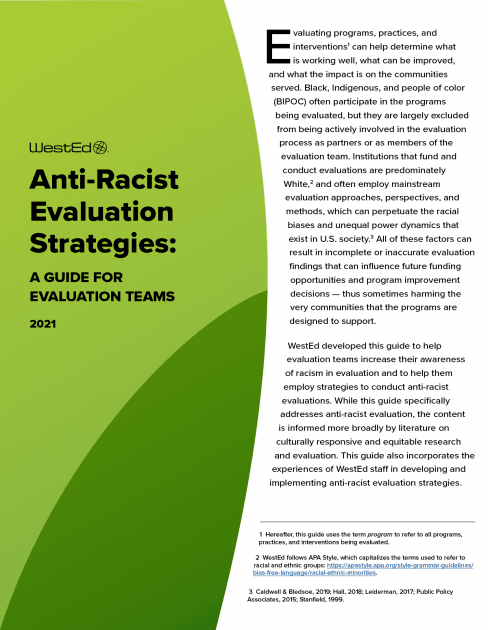Research & Evaluation
WestEd’s approach to evaluating projects is to embed diversity, equity, and inclusion in all phases of the evaluation process.
Guided by the Anti-Racist Evaluation Strategies Guide, we operate with a core set of practices to ensure that we incorporate Culturally Responsive and Equitable (CRE) principles in our evaluations. These practices ensure our teams are staffed with diverse evaluators who can effectively and authentically partner with the communities we serve to focus on creating equitable systems. Throughout our evaluations, we embed participatory methods in our processes–from reviewing data collection protocols to developing dissemination strategies.

- Build our teams with diverse evaluators
- Partner with members of the communities we serve through the programs we evaluate and include authentic community engagement
- Embed participatory methods throughout the process, from reviewing data collection protocols to developing dissemination strategies
- Focus on systems change
Our Work in Action
WestEd’s evaluation of the Inclusive Graduation Education Network (IGEN) includes a study of grant program implementation and tracking progress toward meeting the overall goals of the National Science Foundation (NSF) INCLUDES Alliance, while always keeping equity at the forefront of the work. For example, WestEd works with a paid committee of graduate students in IGEN Bridge Programs to inform the evaluation design, implementation, reporting, and dissemination.
Anti-Racist Evaluation Strategies: A Guide for Evaluation Teams
Evaluating programs, practices, and interventions can help determine what is working well, what can be improved, and what the impact is on the communities served. Black, Indigenous, and people of color (BIPOC) often participate in the programs being evaluated, but they are largely excluded from being actively involved in the evaluation process as partners or as members of the evaluation team.
Meanwhile, many of the institutions that fund or conduct program evaluations are predominantly white and often employ mainstream evaluation approaches, perspectives, and methods, which can perpetuate the racial biases and unequal power dynamics that exist in U.S. society.
This guide was developed to help evaluation teams increase their awareness of racism in evaluation and to help teams employ strategies to conduct anti-racist evaluations.
Impact of Our Evaluations
Systemic change requires deep inquiry into the structures, policies, and practices that contribute to inequitable outcomes for students. Our partners are champions of equity, and we work with them to identify learning questions, study program implementation and outcomes, and make data- and research-informed recommendations so programs are primed to achieve the equity-related outcomes they intended.
Our partners at WestEd have provided useful tools and feedback as we developed surveys and interview protocols that focused on issues in educational equity. Their diverse team of evaluators and expertise in culturally responsive evaluation practices has helped ensure that our work is evidence-based and responsive to our teacher residents’ needs and identities.
Briana McCaul Ronan EdD, Project Director of the Teaching for Inclusivity and Equity Residency (TIER), California Polytechnic University San Luis Obispo, School of Education




